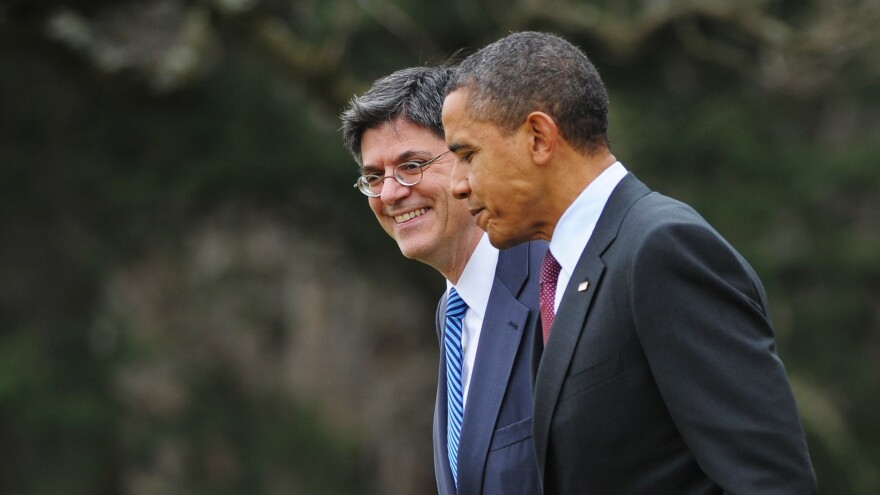Ask the average person — even in Washington — who serves as President Obama's chief of staff and you'll probably get a blank stare.
Jack Lew hasn't been heard or seen in the "fiscal cliff" drama unfolding between the White House and Congress. But the former budget director, who took over the top White House job last January, has become a key player behind the scenes.
If Obama has one person to thank for being in the catbird seat on the fiscal cliff talks, it's Lew, who could be Obama's pick to be the next Treasury secretary. Lew finessed the August 2011 deal that set up the automatic, across-the-board tax hikes and spending cuts that both sides are now scrambling to avoid — especially the Republicans.
"The way they wrote the cliff a year and a half ago was strategically a victory for Obama, and that's just a fact," says former House Speaker Newt Gingrich. "They wrote it in a way that he ends up having all the advantages in the fight right now."
Those 2011 negotiations over the debt ceiling turned out badly for the president. He got no "grand bargain," the nation nearly defaulted on its debts and the president himself was widely perceived to have caved in to Republican demands.
But the deal that came out of it was designed to put Obama in a better negotiating position if he won re-election. Now that he has, he's enjoying the benefits, says Jared Bernstein, the former top economic aide to Vice President Biden.
"The White House was very forward-looking and strategic in the way they shaped the sequester," Bernstein says. "This is a very tough situation for Republicans, in no small part because of the skill of the negotiators from the Democrats' side."
For instance, in making sure that programs like Medicare, Pell grants or food stamps are not on the chopping block when the automatic spending cuts hit. Instead, it's defense spending and the Bush-era tax cuts that are at risk — things that are Republican priorities.
Bernstein says Lew gets a lot of the credit for that.
"Jack Lew's fingerprints are all over the parts of this sequester that protect vulnerable people, whether it's exempting the entitlements or many of the things that help low-income families," he says. "One of the things Jack always deeply understood was just how important that role of government is for people who are retirees, for people who are poor, for people who aren't connected to the economy and the market in the way that a lot of Republicans envision everybody is, but they're really not."
Lew has had years of experience toiling in the fiscal trenches.
Gingrich — who as speaker negotiated the historic balanced budget agreement with President Bill Clinton in the 1990s — says Lew's experience gave Democrats an edge.
"On their side, they have somebody who's playing chess, and on our side we are wavering between tic-tac-toe and checkers," Gingrich says. "He knows so much and he's been through this so often, he can think about three and four permutations down the road."
Before he was White House chief of staff, Lew was Obama's budget director — a job he'd also held in the Clinton White House. After serving in the Clinton administration, Lew followed the well-worn path from White House to Wall Street.
But his experience as an investment banker didn't help him with Republicans when he returned to Washington to work for Obama. During the debt ceiling negotiations, House Republican leaders said they found Lew impossible to work with, rigid and arrogant.
Bernstein says there was discord, but he interprets it differently.
"There was a time during these negotiations where Reps. [John] Boehner and [Eric] Cantor said to the president, 'We don't want to negotiate with Jack Lew anymore. We want to negotiate with [Treasury Secretary] Tim Geithner.' Now, you know, Tim Geithner is a guy I like and respect also, but to me that just kind of elevates Jack Lew's negotiating skills because he was being a little too tough on his opposition there for their liking," Bernstein says.
Because the fiscal cliff negotiations are at a sensitive stage and because Lew may be nominated to be the next Treasury secretary, the White House decided not to make him available for an interview. But it's clear he retains the same strong support from the president as he did when Obama named him chief of staff a year ago.
"Jack's economic advice has been invaluable and he has my complete trust, both because of his mastery of the numbers but because of the values behind those numbers," Obama said at the time.
In Lew's tidy White House office, there are mementos from 30 years of bipartisan negotiations — including the balanced budget deal between Clinton and Gingrich and the Social Security deal of the 1980s between Lew's old boss, House Speaker Tip O'Neill, and President Ronald Reagan. That was the deal that eventually raises the Social Security retirement age to 67.
Lew is clearly proud of those deals, but he'd be even prouder if he manages to move the current negotiations to a deal worth celebrating.
Copyright 2024 NPR. To see more, visit https://www.npr.org.



